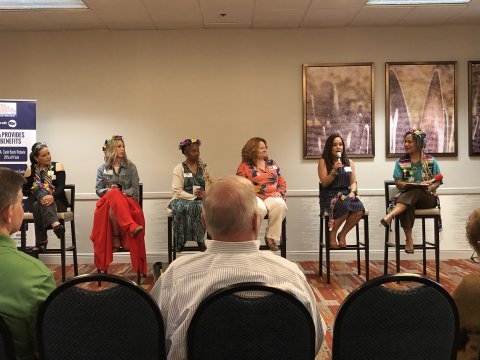Is Cash Really King??

A couple of photos of Veronica sharing her experiences with other investors last night at the Alamo REIA main meeting.
Buy With Cash
We’ve been moving down the stepping stones of the path that we followed up until this post. After house number three, we started discovering the magic of private money and distressed deals. This is where our renovations were more significant and the money invested was traded for creativity and finding good deals. But we have outlined in many previous posts the power of the BRRRR technique so I will skip ahead to a method we haven’t used but that is still appropriate for a select few. That is buying with all cash. Now don’t tune me out just yet because looking at the pros and cons of each method may help you discover new things. You may be thinking that buying with all cash is just impossible. But it happens all the time. So why might some use this method if the ROI is higher using leverage?
Why Use Cash?
One reason someone may choose to save diligently and buy with all cash is an intolerance for debt. Whether you are a Dave Ramsey follower or not, some people just cannot stomach the perceived risk of using debt. Even though the ROI may be lower, the conventional measure of risk is lower too. I’ve talked about other ways that risk can be seen; to include the devaluation of money that sits idle earning very little, but for now we’ll consider it from the very practical position of one who has a property that they are worried may sit vacant. They still have to pay insurance and taxes but there is no mortgage to feed through a vacancy. That is pretty low risk. Also, you are still in the real estate game and get some of those sweet tax benefits like depreciation. It’s a tangible asset unlike stocks and bonds that you might also buy with cash. You can own property in your IRA! What?!?! You could get into the game by moving an IRA to a self-directed IRA custodian such as Quest Trust Company and actually own property in your IRA. Witchcraft, you say? Nope. This is totally legit and a cool idea to get into the game when you don’t have a lot of cash but have an old 401K or IRA with some built-up value. There are rules you must follow but it is very doable. You can also loan to other investors from your self-directed IRA (we borrow from IRAs often-and the lenders love the high return we pay into their retirement account) but that is for another post.
Recently, it occurred to me that there are some people that have bad credit due to unforeseen circumstances that were at least partly outside of their control. This makes banks shy away. But if they are aggressive savers, they can get in the game this way. Credit score does matter when dealing with traditional lending institutions.
You Can Still Create Equity When Using Cash
You may still buy at a discount with cash and fix it up to create additional equity. This way you could still create some added equity and boost your ROI from just buying a retail deal. You could buy cash and then borrow against the house for other uses such as businesses or lending out at higher rates of return while still maintaining control of the asset. This essentially still puts a lien on the property but is an option for you with an otherwise unencumbered property.
You might have a capital gain from the sale of anther property and choose to use a 1031 tax-deferred exchange to defer the taxes and you may spread that money over multiple properties and choose to leverage some and pay one or two off.
You may want to move equity from your home and borrow at the lowest rate (primary residence loans are often as much as a percentage point lower than investment property loans) to pay off a rental property you own or buy a rental property. This was going to be a topic for its own post but it seems to fit here. This all has to do with what value you put on equity in your home. This gets very personal and also involves your long-terms plans and stage of investing. Some people see equity as “dead equity” if they aren’t getting a return on it. If moved to a little rent house, it might produce some return. Consider a mortgage payment on your house of 1,200 dollars per moth for principal and interest (P&I). No need to include taxes and insurance because you’ll pay those whether the house is paid off or not (who said you ever get to truly own your home outright?) Now let’s say you have 100,000 in equity in your home and you owe 150,000 dollars for a market value of 250,000. Now, that equity isn’t making any money. It’s just helping you toward paying off your mortgage; which is a fine pursuit if debt freedom is your plan. But if you are wanting to get into the real estate game; this is just another way to look at that equity. Now let’s say you did a cash-out refinance and pulled out some equity. For a primary residence, under current lending guidelines, you could pull up to 80 percent of the market value. This would be about 50,000 dollars (250,000 x .80 = 200,000 and 200,000 -150,000 = 50,000) This brings your mortgage up to 200,000 dollars and your payment may come up 200 dollars or so per month (too many variables to say for sure-just follow the concept here). Do you think you could get into the game for that amount of money? I know you could. Using any number of strategies. You could get into a deal that will pay more than the 200 dollars per month that your mortgage went up. Now you control more real estate and can benefit from the tax benefits and appreciation on multiple properties. And more Importantly, you got the first deal done and you begin to build your credibility. This is just another way to view home equity. No right or wrong answers; this is to get us all thinking about the multiple ways to get started-not all of these are right for every person. There is no right answer.
Or you may buy a house cash and sell it on terms to receive a high interest rate over a long term that is secured by real estate. Not a bad way to make 8-10 percent or more without relying on Wall Street. This is generally called the “owner finance” model.
“Cons” of Cash?
But what are the “Cons” of buying with cash? Well for most folks it takes forever to save up that much scratch (skrilla, cabbage, moolah, dough, dinero…okay, okay, enough). Even with a high savings rate, this can take a long time for middle-class folks like me. Now once one property is paid for and is cash flowing, the cash flow can be quite strong so if you add that positive cash flow to your high savings rate it could really start to build momentum. The speed at which you can grow your portfolio will essentially grow like an equity snowball. That’s pretty cool. And pretty darn safe.
Another con is that it isn’t taking advantage of the cheapest, longest-term debt available. You don’t get the same kind of inflation protection because you buy at today’s value with dollars at today’s value and sell in the future in dollars that are worth less than today’s value-if you think we are going to be in an inflationary environment for the foreseeable future.
You won’t control as much real estate if we see inflation and appreciation so you will essentially miss out on some equity growth. In a downturn, you don’t share your risk with anyone either. Every penny of decrease in equity is you money. In a BRRRR deal, you can potentially lose equity without losing your invested dollars as I have written about in previous posts. If the loss is significant, in a leveraged deal, the bank is also involved and has a vested interest. They essentially are your partner.
Who Do The Banks Help?
Side note: In the downturn of ’08-’09 we saw many people get loan modifications to keep them in their homes or investment properties. Most of these work-outs were offered to people with high leverage because the banks didn’t want to take back the properties in bulk. People with high equity (low leverage) weren’t worked with as often because the banks didn’t have anything to lose (and actually might gain by foreclosing on a high-equity house) but the owners had a lot of skin in the game and reason to fight it out. This illuminates how smart leverage makes the bank your partner in the deal; to some extent. I am beginning to see that in the future I may lean towards some properties completely paid off and some with high leverage rather than a lot with medium leverage. In the words, moving equity by refinancing to have an 100,000 dollar house paid off and a loan of 75k on another 100,000 dollar house, rather than loans of 62,500 dollars on each of them. I’m still working this out but it seems to make sense based on this historical information on loan modifications.
Now I am not, by any means, in favor of not making good on your loans. And I am not in favor of reckless borrowing or lending. But in the downturn (housing crisis) of ’08-‘09, the banks had been lending recklessly and profiting hand over fist but then they got in a bind when the market turned and so many American’s were upside down in their loans. I also don’t feel sorry for the banks. They don’t feel sorry for the consumer. It is a business transaction. They didn’t do loan modifications out of compassion for the borrower; they did it to save themselves and the business decision was to help those who were upside down and in high-leverage positions. This is just my opinion and based on the reading I have done. I am not an economist or banker but it seems to me that this is how it played out.
I hope this post helps you see one more way to get started investing. I hope it helps you stretch to see other ways to deploy equity, cash, and leverage. I want to help average people find a way to get started. Let me know if this gave you any new ideas. I hope you are hungry because being hungry makes you want this bad enough to get over the hump of the first deal. It also makes you want to consume information to learn more and become more sophisticated as an investor. Most people will never act on this information. I have seen this to be true. Don’t be “most people”. Learn all you can but don’t forget to take action! And in the midst of it all, “keep the main thing the main thing!”
